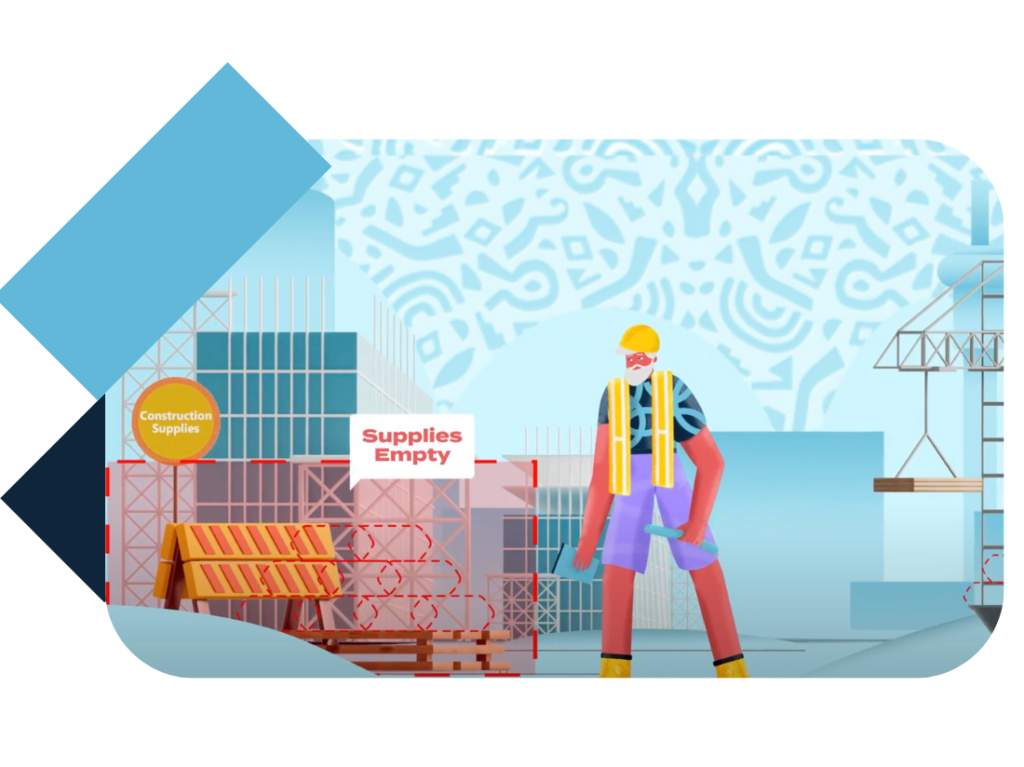Construction is a big business in South Africa – and it’s getting bigger in 2024. This past year, the sector contributed 2.7% of the country’s total GDP, but it looks like even that percentage is set to increase, if construction companies can overcome critical challenges that lay ahead.
The post-pandemic construction industry is now set to grow at a CAGR of 5.8% between 2023-27, outpacing the country’s GDP by over four times as much, consulting firm ConsTrack360 predicts.
Thanks to growing governmental investments in large construction projects, the CIDB expects strong demand for contractors, subcontractors, and construction professionals over the coming years.
After a general lack of construction projects in recent years, business owners and stakeholders stand to gain in 2024 and the coming years.
Garth Rossiter, Chief Risk Officer at Lula, South Africa’s first dedicated SME banking platform, backs this up. “Construction has been one of the fastest growing sectors in the SA economy in the past quarter and I expect this will continue in 2024.”, he says.
Construction has been one of the fastest-growing sectors in the SA economy in the past quarter and I expect this will continue in 2024, says Rossiter.
Yet, success in the construction business is far from guaranteed.
Business owners face major challenges that range from load shedding to labour shortages, and from supply chain disruption to lack of access to funding. All these major problems affect project management, cut into profit margins, and dry up cash flow.
No wonder 2022 saw construction sector liquidations up 32%, with 94 SA construction companies closing their doors, according to media group Moneyweb.
So what are the biggest challenges facing the construction industry in 2024 and how can you best capitalise on the projected growth in this difficult environment?
In this article, we will analyse eight construction challenges impacting South African construction firms today. Understanding these issues is the first step for you to mitigate risks and ensure resilience.
Read on to learn more.
Is your construction company facing financial challenges? Apply today for fast, flexible funding from SA’s first dedicated SME banking platform.
1. Loadshedding and poor electricity infrastructure
Due to an ageing electricity grid and insufficient generating capacity, South Africa has struggled with rolling blackouts known as load-shedding.
But to call loadshedding one of the biggest challenges facing the construction industry is an understatement – it directly affects both construction sites and the wider supply chain of construction materials.
“Loadshedding has had a significant impact on construction projects and the production of materials, causing delays and also increasing costs”, says Garth Rossiter.
Data from publication The Outlier shows a 45% increase of days with loadshedding in 2023 with a dramatic spike in high-stage loadshedding.
Unplanned power outages force construction sites to halt work. This complicates construction project management and the ability to deliver projects on time, which can seriously affect a company’s credibility and cash flow.
It can also lead to even harsher consequences, according to Rizia Parker, Head of Sales at Lula.
“Load shedding has not helped as many projects have experienced delays, which has led to penalties being imposed as deadlines are not being met – this has had a direct influence on forecasted profit margins.”
SA companies are trying to adapt by embracing advancements in technology and generating more energy efficiently, as well as tapping into renewable energy sources.
Solving these infrastructure issues at a national level is critical for the sector’s future.
2. Materials costs and shortages
The construction industry in South Africa is facing critical shortages of building and construction materials, including cement, steel, bricks, and timber – reports Moneyweb.
Factors like supply chain disruptions, inflation, and import reliance make acquiring affordable materials a struggle.
One of the main impacts to the construction industry is inflation, as it has resulted in a significant increase in material costs, says Parker.
The shortage of building construction materials has had a direct impact on the industry’s ability to meet demand and complete projects within agreed schedules and quality standards.
Researchers at Cape Peninsula University of Technology, too, identified inflation and high costs as major factors leading to incomplete and substandard buildings.
To address the material shortages in the construction industry in South Africa your company can:
- Diversify its supplier base to spread the risk of shortages
- Collaborate among industry stakeholders to build a more resilient industry
- Invest in local production of building materials to reduce reliance on imports and mitigate the impact of global supply chain disruptions
3. Transport and logistics disruptions
Efficient supply chains are vital for construction, but logistics are a major challenge in South Africa.
Supply chains are increasingly reliant on road freight as the rail infrastructure deteriorates, reports Engineering News. But issues at the ports – whether strikes or failing machinery – are major challenges for the trucking industry as well as for businesses.
When the flow of raw materials is disrupted, projects grind to a halt as crucial components don’t arrive on site as scheduled.
Construction firms should evaluate expanding local sourcing and increasing material orders to stockpile for contingencies. For some firms, having an accessible financial solution that can help with funding is key.
However, solving the root causes of an unreliable distribution network remains critical for the sector as a whole. On a national level, investing in transport and logistics infrastructure can help minimise disruptions.
4. Unpredictable weather events
Climate change is one of the growing challenges facing the South African construction industry due to the impact it has on the project life cycle, concludes a scientific study written for the Applied Research Conference in Africa.
South Africa has experienced rising occurrences of severe storms, flooding, droughts, and other extreme weather affecting job sites. The construction sector has struggled to adapt.
“The influence of weather variables and weather forecasts this year has been unpredictable […] Due to the changes in the weather patterns it has made it harder to plan ahead because of doubts about the accuracy of what the weather forecasts will be,” Rizia Parker comments.
Construction project management needs to include an informed and proactive approach to prepare for climate change during the tender phase. Companies need to have ample information to adapt their cash flow forecasting.
However, researchers of the aforementioned study conclude that construction businesses and firms do not realise the reality and seriousness of climate change and its impact.
Moving into 2024 and beyond, this major problem only becomes more pressing.
5. Labor shortages and rising costs of skilled workers
The construction industry in South Africa is hampered by a mismatch between available construction workers and required skills, and the high quantity of industry participants who have no education or degree.
Skilled immigrants are often hired over unskilled South Africans as construction companies take on big projects.
Closing the skills gap among SA construction workers is crucial for building domestic capabilities and meeting growth targets, concludes a research paper written on behalf of the Creative Construction Conference 2021.
The lack of local talent presents an extra problem for construction firms as the competition for qualified employees drives up wages. This increases operating costs and dries up cash flow faster.
6. Slow technology adoption
Construction tech is booming yet the construction industry in South Africa has been slow in adopting new technology, which has implications for its efficiency and productivity.
In a sector known for being traditional, South African contractors lag global peers in technology adoption like 3D printing, drones, and building information modeling (BIM), according to research published in the IJBPA journal.
A global survey performed by McKinsey for construction event Big 5 shows that contractors (26.7%) and professionals (35.7%) regard BIM as the number one technology to impact construction businesses over the next two years.
When interviewed by media outlet Bizcommunity, Databuild CEO Morag Evans stressed the increasingly beneficial role technology has to play in the construction industry, particularly in reducing costs, keeping project timelines on schedule, and increasing on-site security and safety.
Evans also highlights the potential for technology to create jobs and enhance sector sustainability, ensuring business resilience over the long term.
“The industry can no longer afford to delay the adoption of technology, both on-site and off the construction site.”
7. Project delays and cost overruns
Missed deadlines and over-budget projects remain nagging issues in South African construction.
While these challenges facing the construction industry all cause unforeseen disruptions and rising material costs, it’s internal factors like poor planning, shoddy workmanship, and mismanaged expectations that often contribute to these costly outcomes.
With so many external challenges already affecting the construction industry in South Africa, solving internal mismanagement should be business owners’ top priority.
On a governmental level, incorporating project management, safety training, and financing in the curriculum would help educate and improve construction agent’s knowledge, skills, and understanding of potential cost overruns in every project.
As well as this, a scientific study done at the University of Johannesburg revealed factors causing cost overrun of a financial nature, high-interest rates by bankers, inflationary pressure, and poor financial management on-site.
8. Lack of access to funding
Access to capital remains a perennial challenge for South African construction businesses. In short, high-interest rates make financing expensive.
Volatile cash flows in the project-based sector also necessitate access to working capital and bridging finance.
“Construction income, by its nature, is quite ‘lumpy’ and this means access to short-term cash-flow to carry costs for a couple of months is vitally important, and one of the bigger challenges facing the sector,” said Garth Rossiter. As banks cut back on lending, alternative funders are filling the void.
Still, financing constraints put a drag on the industry. With better funding availability, contractors could invest in technology and capacity to boost productivity and competitiveness.
Construction income, by its nature, is quite ‘lumpy’ and this means access to short-term cash flow [is] one of the bigger challenges facing the sector, says Rossiter.
Amid the many other major challenges facing the construction industry in 2024, alleviating capital-access bottlenecks will be key going forward.
9. Get ready for the challenges facing the construction industry in 2024
Operating businesses in the construction industry in South Africa will face an array of challenges in 2024 that create risk and uncertainty.
From electricity woes to weather disruptions, and supply shortages to skills gaps, the sector must navigate a range of major problems that threaten efficiency, profitability, and the bottom line.
Most acutely, these challenges can strain your company finances and cash flow projections.
Revenue volatility, penalty fees, input inflation, and lending constraints create a perfect storm that dries up working capital. As Rossiter noted, construction firms need short-term financing to bridge gaps and carry costs.
Lula, South Africa’s first dedicated SME banking platform has a solution. Our Cash Flow Facility offers flexible funding that gives you fast, easy access to working capital when you need it.
With the ability to access fast, flexible financing, your business gains a buffer against disruption. While other companies struggle, you can stockpile materials, attract and retain top talent, invest in new tech, and absorb rising costs through temporary setbacks.And when the finances look good, you can better position yourself well for the coming construction boom.
The outlook for 2024 is positive but remains filled with hurdles for South African construction firms. With funding solutions like Lula’s Cash Flow Facility, companies can overcome the headwinds and pursue sustainable growth.



